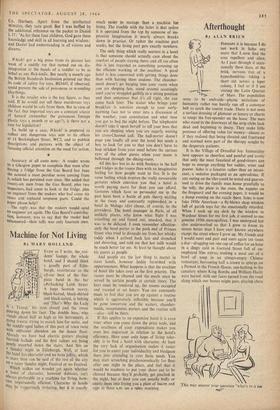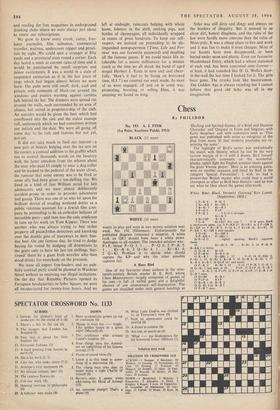Afterthought
By ALAN BRIEN
It is the Village of Dreadful Joy. Immorality here appears so cheerless and painful and costly that only the most fanatical of good-timers can hope to emerge anything but sadder, wiser and poorer. Soho is a laxative rather than an intoxi- cant, .a sedative packaged as an aphrodisiac. If any outing on the tiles could be tested and guaran- teed to drive the family man home gratefully to the telly, the plate in the oven, the nappies on the fireguard and the evening paper, it would be a damp evening on the razzle there. Soho is now fake 1950s American—a fly-blown shop window full of garish toys for the emotionally retarded. When I took up my desk by the window in VVardour Street for my first job, it seemed to me genuine 1930s metropolitan. I was underpaid but also underworked so that I grew to know its streets better than I have ever known anywhere except the street where I grew up. My friends and I would meet and part and meet again ten times a day—dragging out one cup of coffee for an hour in a dingy cafe in Gerrard Street full of un- employed film extras, making a meal out of a bowl a soup in an always-empty Chinese restaurant, borrowing half a crown to splurge on a Pernod in the French House, sun-bathing in the cemetery where King Bomba and William Hazlit were buried, with our faces turned from the road along which our bosses might pass, playing chess 'This may answer your question "what's in it tor
me?" ' and reading the free magazines in underground drinking clubs where we were always just about to renew our subscriptions.
We grew to know every crook, cutter, free- lance journalist, film salesman, commercial traveller, waitress, undercover copper and prosti- tute by sight. We could spot a stranger at fifty yards and a provincial even round a corner. Each day lasted a week at current rates of time and it would be punctuated by small surprises and minor excitements. It was a world in a state of suspended animation as if in the last years of siege which had begun almost before we were born. The pubs were still small, dark, cool and private with remnants of black-out around the windows and posters warning against careless talk behind the bar. The drinkers were spread out around the walls, each surrounded by an area of silence, but united in proprietorship of the club. An outsider would be given the beer which had overflowed into the sink and the stalest sausage roll, underneath which we had sometimes written our initials and the date. We were all going off some day to be rich and famous but not yet, not yet.
It did not take much to feed our interest-a new pair of breasts bulging over the tea urn on the corner, a comical addition to the graffiti which ran to several thousands words on the lavatory wall, the latest anecdote from the whores about the man who paid E5 simply to wear a,dog collar and be leashed to-the pedestal of the water closet, the rumour that some enemy was to be fired or some ally had been given a ten-shilling rise. We lived in a kind of Just William serial for late adolescents and we were almost deliberately accident-prone in order to provoke adventures and gossip. There was one of us who hit upon-the brilliant device of evading weekend duties as a public relations assistant for a Jewish film com- pany by pretending to be an orthodox believer of incredible piety-and then was the only employee to turn up for work on Yom Kippur. There was another who was always trying to buy stolen property off plainclothes detectives and knocking over the double gins of tearaways in their Sun- day best. On one famous day, he tried to dodge buying his round by dodging off downstairs to the gents only to have his last ten shillings 'bor- rowed' there by a giant Irish wrestler who then stood drinks for everybody on the proceeds.
We were all expert free-loaders and no pub- licity cocktail party could be planned in Wardour Street without us receiving our illegal invitations. On the day that Republic Pictures opened its European headquarters in Soho Square, we were all incapacitated for twenty-four hours. And we
left at midnight, raincoats bulging with whole hams, lobsters in the shell, sucking pigs, and bottles of champagne, all individually wrapped in reams of press handouts. To keep our self- respect, we insisted on pretending to be dis- tinguished newspapermen (Time, Life and For- tune' was our favourite password) and insulting all the famous guests. If we could make life in- tolerable for a movie millionaire for a minute (such as the time we all shook the hand of aged mogul Herbert J. Yates in turn and said cheer- fully, 'How's it feel to be living on borrowed time, H.J.?') we counted our week made. As most of us were engaged, off and on in some way, promoting, boosting or, selling films, it was amazing we lasted so long.
Soho was still dirty and dingy and always on the borders of illegality. But it seemed to us clean dirt, honest dinginess, and the rules of the law were hardly more onerous than the rules of Moncpoly. It was a cheap place to live and work and it was fun to make it even cheaper. Most of our haunts have now disappeared, or been buried under neon and plastic. Even our favourite Maidenhead Entry, which had a whore stationed at each end, has been concreted over forever- at least, it had vanished like H. G. Wells's door- in-the-wall the last time I looked for it. The girls have gone. The crooks look like businessmen. The Golden Age is always receding but I cannot believe that good old Soho was all in my imagination.



































 Previous page
Previous page